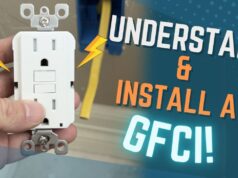My name is Aaron Massey from mrfixitdiy.com and today I’m here to share 5 DIY Ways to Make Your Home More Energy Efficient! This video is sponsored by Trane Residential, a leading provider in indoor comfort solutions.
Summertime means cranking that air conditioning in the house to cool it down which can really impact your home’s energy consumption. Today I’m here to share a few things that you can do around your home to help make your space more comfortable and energy efficient, which reduces your impact on the environment.
So let’s get started!
#1: Replace Your Indoor and Outdoor Light Bulbs with LED’s
 Replacing your light bulbs is one of the simplest and most cost-effective ways to make your home more energy efficient. Typical CFL or older
Replacing your light bulbs is one of the simplest and most cost-effective ways to make your home more energy efficient. Typical CFL or older
incandescent bulbs use anywhere from 40w-100w a piece and the newer LED equivalents typically range from 10-20w for the same light output.
They’re a little more expensive on the front end, but their bulb life is exponentially longer and the cost savings on your energy bill adds up quickly.
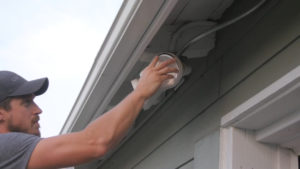 Many people may think to replace their interior bulbs. Also, consider replacing exterior landscape bulbs and motion lights. It’s not uncommon for exterior bulbs to be 150w so replacing them can add up to
Many people may think to replace their interior bulbs. Also, consider replacing exterior landscape bulbs and motion lights. It’s not uncommon for exterior bulbs to be 150w so replacing them can add up to
significant savings over time.
#2: Inspect Your Attic Insulation and Replace it if Necessary
 One specific area to consider is your attic. If you’re like me, it’s not an area you particularly like to work in. Still, it’s a vital part of keeping your home as efficient as possible. It keeps heat in during the winter, but it also helps keep the heat of your roof from radiating into your living space in the summer.
One specific area to consider is your attic. If you’re like me, it’s not an area you particularly like to work in. Still, it’s a vital part of keeping your home as efficient as possible. It keeps heat in during the winter, but it also helps keep the heat of your roof from radiating into your living space in the summer.
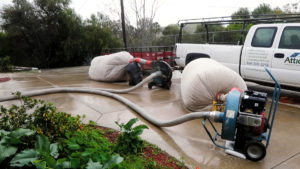 Go into your attic and make sure that insulation coats the entire living space. It may be blown in, in batt form, or a combination of the two. If your insulation is sporadic, very thin, or has been infested with critters, consider having it replaced or adding additional insulation on top.
Go into your attic and make sure that insulation coats the entire living space. It may be blown in, in batt form, or a combination of the two. If your insulation is sporadic, very thin, or has been infested with critters, consider having it replaced or adding additional insulation on top.
#3: Update Your Old Thermostat to a New Smart Thermostat
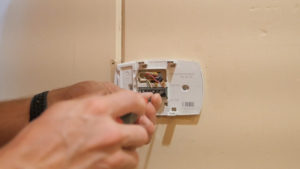
Upgrading your HVAC themostat provides
another environmentally friendly tool in saving energy. A programmable thermostat allows you to set back your home’s temperature when you’re away, such as at work for the day or on a lengthy vacation. For instance, you can program up to 4 schedules a day, 7 days a week. Smart versions like the Trane Connected Thermostat – XL 824 or XL1050 – expand those capabilities and give you the ability to adjust settings from anywhere when preferences or plans change.
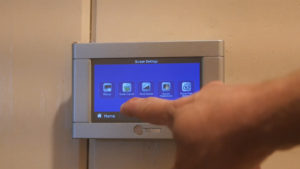 In fact, these thermostats are so advanced, they also come with other key features like Wi-Fi connection, built-in
In fact, these thermostats are so advanced, they also come with other key features like Wi-Fi connection, built-in
Nexia Bridge (which gives you the flexibility to remotely monitor and control over other smart home devices such as your home’s lights, locks, and even your garage).
#4: Clean Your HVAC Condenser and Change Your Air Filters
One of the easiest ways to make sure your HVAC system is functioning properly and not overworking is to connect with your local HVAC technician for a seasonal maintenance. Trane provides an awesome certified contractor locator to help you find a company nearby to come evaluate your system. Another option is to follow these basic steps to cleaning the outside condenser and change the air filter inside.
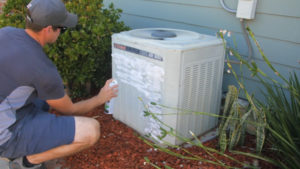 1.) To clean your condenser coil, first make sure power is shut off to the unit by turning off the power at the disconnect near the unit. 2.) Use a shop vac with a soft bristle attachment to vacuum any loose material or debris that may be inhibiting the cooling coils from working properly. 3.) Use a foaming condenser cleaning product to spray all over the condenser and let it soak for about 10 minutes. 4.) Then rinse the coil with clear low pressure water to remove remaining dirt and debirs. 5.) After that, you’re good to turn the power back on.
1.) To clean your condenser coil, first make sure power is shut off to the unit by turning off the power at the disconnect near the unit. 2.) Use a shop vac with a soft bristle attachment to vacuum any loose material or debris that may be inhibiting the cooling coils from working properly. 3.) Use a foaming condenser cleaning product to spray all over the condenser and let it soak for about 10 minutes. 4.) Then rinse the coil with clear low pressure water to remove remaining dirt and debirs. 5.) After that, you’re good to turn the power back on.
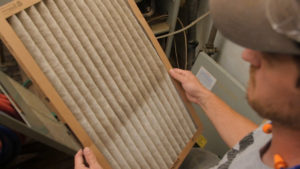 You should do this about once a year to make sure your condenser is clean and working properly. Also, while you’re at it, make sure that there are no plants or obstructions within about 12” all around the unit that make it hard for the unit to breathe properly. If there are, make sure to trim it back. Changing your filter is simple. Just find your air intake for your unit and replace it with the proper size filter. You can find the size you need written right on the side of the previous filter. I recommend you do this around every 3-6 months.
You should do this about once a year to make sure your condenser is clean and working properly. Also, while you’re at it, make sure that there are no plants or obstructions within about 12” all around the unit that make it hard for the unit to breathe properly. If there are, make sure to trim it back. Changing your filter is simple. Just find your air intake for your unit and replace it with the proper size filter. You can find the size you need written right on the side of the previous filter. I recommend you do this around every 3-6 months.
#5: Replace Old Single Pane Windows with New Energy Star Rated Options
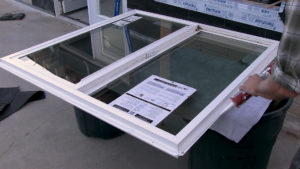 Adding replacement windows or updating windows around your home during a remodel project is a great way to improve the overall energy efficiency of your home. Old single pane windows allow the heat of the sun’s rays to radiate into the home. This can significantly raise the interior temperature which means your A/C system needs to work harder to cool the home.
Adding replacement windows or updating windows around your home during a remodel project is a great way to improve the overall energy efficiency of your home. Old single pane windows allow the heat of the sun’s rays to radiate into the home. This can significantly raise the interior temperature which means your A/C system needs to work harder to cool the home.
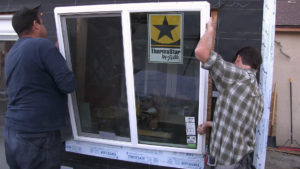 New double paned windows have an insulating gas between the panes which allows for less heat energy transfer into the home and thus are much more energy efficient. A local window expert can help you decide on what types of windows are right for your home.
New double paned windows have an insulating gas between the panes which allows for less heat energy transfer into the home and thus are much more energy efficient. A local window expert can help you decide on what types of windows are right for your home.
Hopefully these tips help give you some ideas to get your home’s energy consumption under control. Not only will it help save you money, but it can help lessen your environmental impact. If you are considering making some energy efficient improvements, I recommend looking at your local utility company’s website. Oftentimes, you can find rebates for energy efficient upgrades to your home that can help you offset those initial costs. Your local and state governments may also have some incentives to take advantage of. All it takes is a little research.
I’d like to thank the Trane team for sending over the XL824 connected thermostat I installed in the video and for making this project possible. If you’d like some more information on additional energy efficient upgrades you can do around your home, check out Trane’s website.
Thank you, for watching and if it’s your first time visiting the channel, please hit that subscribe button and hit that notification bell so you never miss out on any of the new content I put out. And as always, I encourage you to leave me a comment
down below and let me know what energy improvements you plan on tackling down the road.
Thanks so much for watching and I’ll see you next time.


